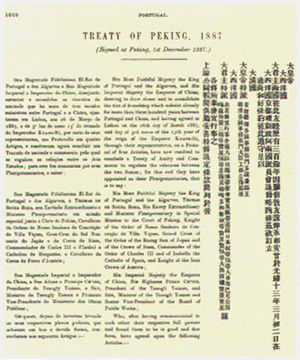|
Sino-Portuguese Treaty of Peking
The Sino-Portuguese Treaty of Peking was a trade unequal treaty between the Kingdom of Portugal and the Qing dynasty of China, signed on 1 December 1887. It is counted by the Chinese as among the unequal treaties in the aftermath of the Second Opium War. The treaty gave Portugal perpetual colonial rights to Macau on the condition that Portugal would cooperate in efforts to end the smuggling of opium. BackgroundOn 13 August 1862, China and Portugal signed the Treaty of Friendship and Trade in Tianjin. The treaty was largely a trade agreement, but it also defined Macau's political and juridical status, although it did not directly mention the issue of Portuguese sovereignty.[1] It contained two clauses regarding Macau's status: Article II annulled earlier agreements and referred to Macau as "formerly in the Province of Canton", while Article III recognised the status of a "Governor General of Macao." However, China did not ratify the treaty and it became void in 1864.[2] In June 1886, a joint Sino-British commission advised that the administrative responsibility for controlling the import of opium into China should be transferred from the Hoppo in Canton (Guangzhou) to the Chinese Imperial Maritime Customs Service. Although Britain and China agreed to this, it could not be fully successful without Portuguese involvement. In 1887, China sent a diplomatic mission to Lisbon, which included James Campbell, a senior British member of the service, representing the superintendent of the customs service Sir Robert Hart. On 26 March 1887, Campbell and Portuguese Foreign Minister Henrique de Barros Gomes signed the four-point Lisbon Protocol:[3]
TermsPortugal followed up on this agreement by sending an envoy to Beijing, where a treaty of amity and commerce based on the protocol was drawn up.[2] On 1 December 1887, the Treaty of Peking was signed by Chinese representatives Yikuang (Prince Qing) and Sun Iu-uen, and Tomas de Sousa Rosa for Portugal on 1 December 1887. It contained 54 articles and was ratified on 28 April 1888.[3] Articles II and III stated:[2]
According to the Portuguese interpretation, sovereignty over Macau was surrendered to Portugal. In the Chinese interpretation, however, only administrative rights were transferred. AftermathAfter December 1887, issues related to rent payments and the presence of a Chinese custom house or resident mandarin in Macau became irrelevant outside of academic interest.[2] The early 20th century marked a new era for both countries, with Portugal's 1910 and China's 1911 republican revolutions establishing new governments. A growing nationalist movement in China voiced disapproval of the treaty and questioned its validity. These contentions manifested themselves in the unresolved topic of Macau's border demarcation.[1] Although the Nationalist (Kuomintang) government in China vowed to abrogate the "unequal treaties", Macau's status remained unchanged. The 1928 Sino-Portuguese Treaty of Friendship and Trade reaffirmed Portuguese administration over Macau.[4] In 1945, after the end of extraterritorial rights in China, the Nationalists called for the liquidation of foreign control over Hong Kong and Macau, but they were too preoccupied in the Chinese Civil War with the Communists to fulfill their goals of a "rights recovery" campaign.[5] After the 1974 Revolution in Portugal, a new decolonisation policy paved the way for Macau's retrocession to the People's Republic of China (PRC).[4] Portugal offered to withdraw from Macau in late 1974, but China declined the offer in favour of a later time because it sought to preserve international and local confidence in Hong Kong, which was still under British rule, as well as its focus on plans to unify Taiwan with the PRC. In January 1975, Portugal recognised the PRC as the sole legitimate government of China and ended ties with the Nationalists in Taipei. In 1976, Portugal unilaterally changed the legal designation of Macau from a "colony" to "territory under Portuguese administration".[4][6] In 1987, the Sino-Portuguese Joint Declaration was signed and Macau became a "Chinese territory under Portuguese administration".[7] On 20 December 1999—two years after the handover of Hong Kong—Macau was returned to Chinese rule.[8] A copy of the treaty is kept by the Portuguese government while another copy is kept by the Ministry of Foreign Affairs of Republic of China at the National Palace Museum in Taipei, Taiwan. See alsoReferences
Further reading
External links
|
|||||||||||||||||||||||||||||||||||||||||||||||||||||||||||||||

